Mary has requested that the daily message be given each day
to the world. It is read nightly at the prayer service from her Image Building in
Clearwater, Florida, U.S.A. This is according to her request. All attempts will be made to
publish this daily message to the world at 11 p.m. Eastern time, U.S.A.
We acknowledge that the final authority
regarding these messages rests with the Holy See of Rome.
|
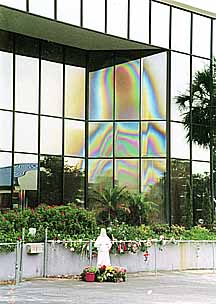 |
October 28, 2000 - Feast of Sts.
Simon and Jude, Apostles
A Prayer for Intimacy
with the Lamb, the Bridegroom of the Soul
Oh Lamb of God, Who take away the sins of the world, come and act
on my soul most intimately. I surrender myself, as I ask for the grace to let go, to just
be as I exist in You and You act most intimately on my soul. You are the Initiator. I am
the soul waiting Your favors as You act in me. I love You. I adore You. I worship You.
Come and possess my soul with Your Divine Grace, as I experience You most intimately.
Messenger: Include Our Lady of the Holy Spirit
Center in 6:20 prayers.
Letter to Jesus
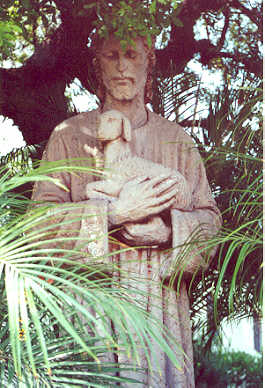 Messenger: Dear Jesus, my
Bridegroom,
Messenger: Dear Jesus, my
Bridegroom,
I need you now. The moments after Communion fade away
so quickly. I want most to help save souls. I want to be so identified with You.
I want to be so deeply united to You, united to the Holy Sacrifice of the Mass in
my prayers and my life.
Our founder has laid down his life to help save souls.
He has written about the Mass and the Church and Mary and You, my beloved Jesus,
and our relationship with the Father and the Holy Spirit, and our relationship
with all in the world. Oh Jesus, I love You so much. As our founder struggles
more with cancer, I feel more committed than ever to help lead souls into a
deeper love union with you.
I am Your bride and I want to live so every moment of
every day, laying down my life for souls. Souls can unite to the Mass and offer
their lives as a sacrifice.
One thing is very clear. We help in this redemptive act
the more fully we are united to the Mass at every moment. When we go to Mass
we can partake in that Sacrifice.
Whether I am at Mass or not, I see You, Jesus, as the
Priest offering Sacrifice and I unite to the Mass in offering myself as a
sacrifice. My heart has hurt lately. I want to pray from the depth of my soul.
Oh God, I thank you for your gifts to us as Shepherds
of Christ. We cannot be as the hired men, we must lay down our lives for the
flock. We love them.
I love You Jesus and all the souls You gave Your life
for. I see how I carry out Your life, death and resurrection in my life. Oh
Jesus, help me unite all my prayers to the Mass and pray through the
powerful intercession of Our Lady of Clearwater and the saints and angels. She
is the Lady Clothed with the Sun. I LOVE YOU.
Ephesians 2: 19-22
So you are no longer aliens or foreign visitors; you are
fellow–citizens with the holy people of God and part of God’s household.
You are built upon the foundations of the apostles and prophets, and Christ
Jesus himself is the cornerstone. Every structure knit together in him grows
into a holy temple in the Lord; and you too, in him, are being built up into a
dwelling–place of God in the Spirit.
Psalm 19: 1-2, 3-4
The heavens declare the glory of God,
the vault of heaven proclaims his handiwork,
day discourses of it to day,
night to night hands on the knowledge.
No utterance at all, no speech,
not a sound to be heard,
but from the entire earth the design stands out,
this message reaches the whole world.
October 28, 2000 - Second Message
Letter to Apostles
Messenger: Dear apostles,
Jesus gave a message yesterday. All apostles should attend daily Mass and do
one hour of adoration if at all possible. Jesus says this is the key. He gives us
the greatest grace. Also we need to pray hourly, even if only for a minute. We
must pray the Healing Rosary for Father and think how important it is to pray
for the world. We must unite as a body to the Holy Sacrifice of the Mass all
day.
Jesus speaks: TODAY, SATURDAY – pray healing rosary at
6:20 p.m. for Father (our founder).
ALL POSSIBLE PLEASE PRAY.
Our Lady of Holy Spirit Center, Florida, China, Indiana,
Morrow, Ohio.
Bead by Bead.
Please use prayer list from yesterday, this is very important.
October 28, 2000 - Third Message
Messenger: Pray for 4 urgent intentions.
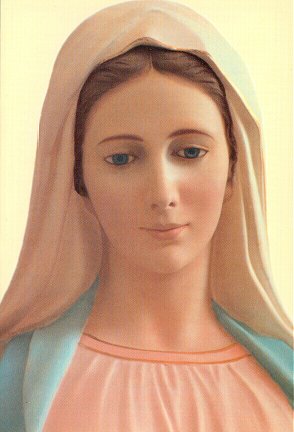
MARY SPEAKS: TELL THE WORLD TO
PRAY THROUGH THE INTERCESSION OF OUR LADY OF CLEARWATER, UNITED TO THE MASS.
PRAY THE ROSARY.
Messenger: Please pray
for the healing of Father Carter through the intercession of Our Lady of
Clearwater.
A Rosary for Healing or for Someone with
Cancer.
On one Hail Mary bead or as many as you desire, say: (this is given for Fr.
Carter, you can replace your loved one's name).
May God heal Fr. Carter through the intercession of Our Lady of
Clearwater in union with the Mass and all the Masses being celebrated around
the world.
Pray the Hail Mary or Hail Mary's then pray this after the Hail Mary.
May the cancer be uprooted and thrown into the sea.
We believe with all our hearts.
After the Glory Be— pray the following petition.
May Fr. Carter be healed through the intercession of Our Lady of
Clearwater if it be the holy will of God.
Note: You can look at Mary on the image rosary while you pray this rosary.


Mary speaks: I WANT YOU TO LOOK AT MY
IMAGE AND PLEAD FOR HEALING THROUGH THE POWERFUL INTERCESSION OF OUR LADY OF
CLEARWATER.
CIRCULATE MY IMAGE ROSARIES.
CIRCULATE MY IMAGE PICTURES.
October 28, 2000 - Fourth Message
Mass Book II Entry
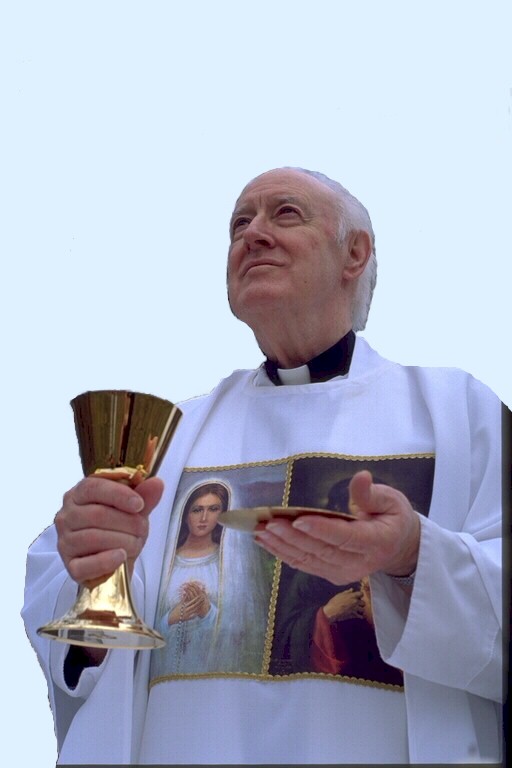
Through Him, With Him and In Him
Chapter 4 - The Sacraments and the Mass
1. The Sacraments in General
2. The Mass
a)
Sacrifice in General
1) Interior Oblation
2) Exterior Offering
3) Immolation of the Victim
4) Acceptance of the Sacrifice by God
5) Partaking of the Sacrificial Victim
b)
Christ's Sacrifice
1) The Interior offering of Our Lord
2) Ritual Oblation
3) Immolation of the Victim
4) The Father's Acceptance of Christ's Sacrifice
5) The Banquet in Christ's Sacrifice
c)
The Sacrifice of the Mass
1) Interior Oblation of the Mass
2) Ritual Oblation of the Mass
3) Immolation of the Victim
4) The Father's Acceptance of the Eucharistic Sacrifice
5) Partaking of the Eucharistic Meal
d)
The Christian's Participation in the Mass
1) The Baptized Christian and the Mass
2) The Mass lived out
Excerpt from Response in Christ (by Fr. Edward
J. Carter, S.J.)
From Chapter Four - The Sacraments and
the Mass
d) The Christian's Participation in
the Mass
God has created man a social being. This fact has relevance
as regards man's salvation and perfection. Man does not go to God alone, but
rather is saved and perfected with and through others. This is evident in the
study of salvation history as one observes God communicating Himself to man in
the framework of community. As we have seen, this social dimension is also
readily evident in the liturgy.
As we now discuss the individual's
participation in the liturgy, we in no way intend to underestimate the
communal aspect of the eucharistic sacrifice. We constantly presuppose it and
its importance. Liturgy as communal is the indispensable framework and
background for any discussion of the individual's liturgical participation.
Granted all this, it is still
useful and necessary to speak of the individual's participation in the Mass.33
Ultimately it is the individual as individual who accepts or rejects
God's offer of salvation and sanctification. Therefore, to speak of the
individual's response to God in the liturgy is highly significant. Despite all
the communal helps the individual receives in the liturgy, despite the fact
that the individual must always be deeply aware that he is a member of the
community, the People of God, it is still true to say that it is within the
depths of his own mysterious, individual personality that the Christian either
becomes a mature Christian through the liturgy or fails to do so. With such
preliminary ideas established, let us now consider the Christian and his role
in the Mass.
1) The Baptized
Christian and the Mass
Once again the reader is reminded that through baptism the
Christian becomes incorporated into Christ and His Church. Confirmation
perfects this incorporation. Although baptism incorporates us primarily into
Christ's death and Resurrection, we again stress that it also unites us with
Christ in all His mysteries. This is so because all Christ's mysteries are
essentially one mystery, for none of them stands separately by itself.
Consequently, one cannot be initiated into Christ's paschal mystery without
simultaneously being incorporated into all of His mysteries.
The fact that all of Christ's
various mysteries are contained in the total mystery of Christ enables the
Christian to encounter the entire Christ in the liturgy. Mention of this fact
brings us to our next point.
In baptism the Christian first
encounters and relives the mystery of Christ. He thereby receives a new life.
But this life must be nourished. The Christian must constantly re-encounter
the mystery of Christ, and this he does chiefly through the eucharistic
liturgy. Here the Christian is daily privileged to encounter Christ in the
most intimate fashion. Here above all he exercises his priesthood and
consequently grows in supernatural vitality. We use the word exercise
purposely, since the liturgy is primarily an action, an exercise of the
priestly office of Christ.
Since the baptized Christian is
sacramentally participating in the mystery of Christ at the Mass, his priestly
act must be modeled after that of Christ's. This is true because the life of
grace flowing out of the seals of baptism and confirmation is structured
according to certain modalities or characteristics based on the life of
Christ. This truth was developed at some length in the previous chapter. There
we stated that Christ, the head of the Mystical Body, has determined, through
His own life of sanctifying grace, the general lines of development according
to which His members' lives of grace grow and mature.
Therefore it is evident that the
whole of the Christian's life must be orientated to the Mass and be centered
about it; for in Christ we see His entire life centered around His priestly
act of Calvary. This is true because His interior sacrificial disposition, the
essence of His priestly act, permeated everything in His life.
The baptized Christian should also
bring his daily life, his whole life, to the eucharistic sacrifice. The Church
which assembles about the altar is not a nebulous, ethereal entity, but the
Church of this earth. It is the Church of men and women who are immersed in
the work of this world. As they gather for the eucharistic sacrifice, they are
therefore not removed from the world of their ordinary daily lives to an
unreal world of ritual which has no connection with their temporal cares and
activities. Rather it is the reality of this ordinary daily life which they
bring to offer as priests and victims in union with Christ, priest and victim.
In such a manner, then, the eucharistic sacrifice looks to the past life of
the Christian.34
Yet the Mass also looks to the
future of the Christian. By his participation in the Mass he receives
grace to assimilate in a more perfect manner the mystery of Christ. Ideally,
each Mass participated in by the Christian should mean that he leaves the
eucharistic assembly with a greater Christ-likeness. Thus he takes up his
daily life as a more fervent Christ-bearer.
The Mass as it looks to both the
past and future embraces the Christian's entire life. It is meant to be lived
each minute of the Christian's life. Durrwell says: "The Mass is said in
order that the whole Church and the whole of our life may become a Mass, may
become Christ's sacrifice always present on earth. St. Francis of Sales
resolved that he would spend the whole day preparing to say Mass, so that
whenever anyone asked what he was doing, he might always answer, 'I am
preparing for Mass'. We also could resolve to make our whole lives a
participation in the divine mystery of the Redemption, so that when anyone
puts the question to us, we can always answer, 'I am saying Mass'."35
2) The Mass lived out
As the Christian lives out the Mass, he is consequently
daily laboring with Christ in furthering the work of the subjective
redemption. This is so because Christ's sacrifice was a redemptive act, and
the Church's reliving of this act in the Mass is also redemptive. In this
regard we must remember that the entire universe – not merely man – has
been redeemed. The nonrational and rational world alike await the furthering
of the redemption. St. Paul tells us: "From the beginning till now the
entire creation, as we know, has been groaning in one great act of giving
birth; and not only creation, but all of us who possess the first-fruits of
the Spirit, we too groan inwardly as we wait for our bodies to be set
free." (Rm 8:22-23).
How does the Christian help Christ
redeem the world? (Henceforth the term "world" is to be understood
as including both rational and nonrational creation.) As previously stated,
the Christian helps Christ redeem the world by reliving Christ's mysteries.
The same "events" or mysteries which accomplished the objective
redemption further the subjective redemption also. Since at the heart of
Christ's mysteries are His death and Resurrection, it is especially these that
the Christian must relive. As the Christian dies mystically with Christ
through loving conformity with the Father's will, he rises with Christ to an
ever greater share in the Resurrection, in the newness of life, in the life of
grace. As the Christian in this manner relives the paschal mystery of Christ,
he is accomplishing not only his own redemption, but he is also, in a
mysterious yet real manner, helping Christ redeem the world.
Although Christ's life was summed
up in death-resurrection, it also included various other "events" or
mysteries. Each of these in its own manner contributed to the redemption. So
it is with the Christian's life. His participation in Christ's
death-resurrection must be "broken down" into the other mysteries of
Christ's life.
The Christian must always remember
that he carries away from the Mass not only the Christ of the death and the
Resurrection, but also, for example, the Christ of the hidden life and the
Christ of the public life. As the Christian lives out his Mass in the exercise
of his Christ-life, all these various mysteries should therefore be present.
Before we give examples of how the
Christian can relive these saving events of Christ's life, it is well that we
first distinguish the two different levels on which the Christian assimilates
the mystery of Christ.
Christ, through His death and
Resurrection, has transformed us. This transformation is a "new
creation," a new life of grace. Through our baptism we are initiated into
this life and consequently we exist as new creatures. As long as we
possess the life of sanctifying grace, which is our share in the mystery of
Christ, we are living according to this new existence whether or not this life
here and now incarnates itself in a concrete, supernatural act. In this sense
the life of grace, the "new creation," is fundamental, radical and
transcendent, a share in the transcendent holiness or mystery of God Himself.
However, God expects that our life
of transcendent holiness incarnate itself in concrete supernatural acts. It is
in this respect that we speak of reliving the various mysteries of Christ
through specific supernatural attitudes and acts. This may also be called
imitation of Christ, but with a certain precaution, namely, that the imitation
in question is to be considered primarily as interior rather than exterior. By
this we mean that although the Christian can to a certain extent imitate
Christ according to what was His external mode of conduct, it is primarily
through adopting the mind of Christ – His interior dispositions – that the
Christian puts on Christ. With this said we now offer suggestions as to how
the Christian relives the mysteries of Christ whose presence and transforming
influences have been encountered in the eucharistic liturgy.
For instance, each member of
Christ, whether he be bishop, priest, religious or layman, can accomplish much
of his redemptive work by an intense reliving of Christ's hidden life.
Certainly our heavenly Father would have us learn a great lesson from this
fact, namely, that His Christ lived out so many years of His earthly life in a
hidden manner, doing the ordinary tasks of the ordinary man. In assimilating
this particular mystery of Christ the Christian must say with Rahner:
"Let us take a good look at Jesus Who had the courage to lead an
apparently useless life for thirty years. We should ask Him for the grace to
give us to understand what His hidden life means for our religious
existence."36
Christ did not lead only a hidden
life, but a public life also. All vocations within the Church are likewise
called upon to reproduce this part of Christ's life in some manner. One aspect
of Christ's public life that should be common to all Christian vocations is
the selflessness, the constant concern and love for others which Christ
constantly and vividly displayed. This concern for others cost Christ much in
fatigue of body and mind. Nevertheless, He continuously gave Himself
completely to others.
Another characteristic of the
public life which all can imitate is that of Christ as witness. Here, then, we
reemphasize within our present context that which was stated in an earlier
chapter concerning the Church's continuation of Christ's prophetic role.
Christ was a witness to the Father, a perfect manifestation of the Father's
truth and love. He bore this witness not only through His formal teaching but
also through His actions, His attitude, His gestures. All members of Christ
are called to give witness also. The Christian's entire life should be a
witness to the truth he holds. The world comes to know Christ through the
Christian. Schillebeeckx comments on this aspect of being witness: "Our
life must itself be the incarnation of what we believe, for only when dogmas
are lived do they have any attractive power. Why in the main does Western man
pass Christianity by? Surely because the visible presence of grace in
Christians as a whole, apart from a few individuals, is no longer
evident."37
St. Paul sums up the redemptive
work of Christ under the mysteries of death-resurrection.38 These
are the principal mysteries which the Christian must assimilate from the
eucharistic liturgy and reproduce in his own life. More and more the Christian
spiritual life is being considered as a process of death-resurrection. It is
obvious why this is so, for if Christ's entire life was summed up in His
death-resurrection, so also is that of His members.
Christ's death and Resurrection
are so closely united that they are two facets of one mystery rather than two
separate mysteries.39 It is likewise with the Christian. The death
aspect of his supernatural life is intimately connected with his life of
resurrection, and in various ways. For instance, his very life of grace is his
life of resurrection, but his continual growth in spiritual death – death
to selfwill in all its numerous manifestations – is achieved through grace.
Consequently, the Christian's life of resurrection always accompanies his life
of death. We also see the two connected more obviously in the sense that a
growth in the death element always results in a growth in the resurrection
element.
The daily life of the Christian,
then, is a combination and antithesis of death-resurrection. As he gives
himself in love to the Father's will, manifested to him in so many
ways, the Christian is achieving both death and resurrection. Christ's
ultimate goal, as man, was His Resurrection. Resurrection, a greater share in
the divine life through grace, is also the goal of the Christian.
These few remarks give examples of
how each member of the People of God is called upon to relive Christ's entire
life as centered in death-resurrection. More could be said. But we think our
remarks have sufficed to indicate how the Christian is to live out these
various mysteries of Christ. Moreover, let it be recalled that all the
mysteries ultimately make up the one mystery of Christ.
What we have said thus far applies
in general to all vocations. But since there are different vocations within
the Church, we must also say that each of these projects Christ in a somewhat
different manner. Each Christian must study how in particular he is called to
put on Christ. Essentially, of course, all put on Christ in the same manner.
Yet there are accidental differences according to the vocation, work and
individuals involved. For instance, the lay person, in general, is called to a
deeper involvement in temporal affairs than is the religious.
Each member of Christ, according
to his particular vocation, work and personality, has something special to
take away from the Mass.40 Each Christian, as he lives out the
mystery of Christ, projects Christ to the world in his own way. Each
Christian, as he himself grows in Christ-likeness, is also helping Christ to
redeem the world in a manner commensurate with his total Christian person. For
holiness is necessarily apostolic whether the Christian at any particular time
is engaged in an external apostolate or not.
Each Christian, according to God's
plan for him, must have a vital and dynamic desire to help Christianize the
whole world. Perhaps he can do very little through direct, external
apostolate. But his prayers and sacrifices – indeed, his entire life – can
touch the whole world. Through an intense Christian life the individual can
help Christ further the redemption of the family, the business world, the
social structure and the like. The Christian is called to have this deep
desire: to see the whole universe imprinted with the name of Christ. How true
it is to say that the Christian's vocation, rooted in the liturgy, calls for
deep involvement in this sacred activity.41
In schematic outline we have
discussed the manner in which the baptized Christian extends his Mass to his
daily existence. As he so lives out his Mass, he is becoming more Christlike.
He becomes a more perfect priest and victim for his next participation in the
eucharistic sacrifice.42 The beautiful cycle which the Mass
contains lies exposed before us. As part of this cycle the Christian is
intimately involved in the process of continued redemption. The Mass is the
center of the Christian life: ". . . the liturgy is the summit toward
which the activity of the Church is directed; at the same time it is the fount
from which all her power flows."43
________
33. Cf. Karl Rahner, Nature
and Grace (New York: Sheed & Ward, 1964), pp. 23f.
34. Cf. Jungmann, "Eucharistic Piety" in Worship,
Vol. 35 (1961), p. 419.
35. F. X. Durrwell, In the Redeeming Christ (New
York: Sheed & Ward, 1963), p. 63.
36. Karl Rahner, Spiritual Exercises (New
York: Herder & Herder, 1965), p. 160.
37. Schillebeeckx, Op. cit., p. 209.
38. Cf. L. Cerfaux, Christ in the Theology
of St. Paul (New York: Herder & Herder, 1959), pp. 190-192.
39. Durrwell, The Resurrection, p. 48.
40. Cf. Karl Rahner, The Christian Commitment
(New York: Sheed & Ward, 1963), p. 168.
41. Cf. Second Vatican Council, Constitution on
the Church, No. 36.
42. For a current treatment of the varied richness of
the Eucharist, cf. J. Wicks, "The Movement of Eucharistic Theology"
in Chicago Studies, Vol. 10 (1971), pp. 267-284.
43. The Constitution on the Sacred Liturgy,
No. 10.
(End of Excerpt from Response in
Christ)

(Please copy and pass out to family and friends.)
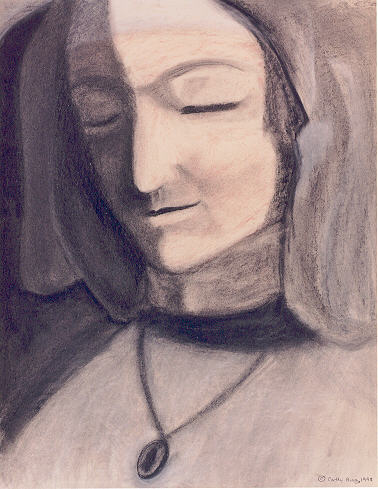 Mary's
Message from the Rosary of August 27, 1996
Mary's
Message from the Rosary of August 27, 1996
Mary speaks: I stood beneath the cross
of my Son, and my Heart was in such pain for I saw Him before my eyes. I saw Him covered
with blood. I saw Him die. My Heart, my children, my Heart to watch my Son, but my Heart,
my Heart, how I suffered for my little children of the world that give in to this world
and give up the love of my Son. O my little children of light, I give you this message.
Carry this light into the darkness for your Mother Mary, for I stood beneath the cross and
I cried. I cried for the little ones. I cried for the young ones, the ones that do not
care and will lose their souls. How do I make you see for you will not listen to me? What
can I do? I come. I appear. I beg. I plead. I give you these gifts from my Son, and you
reject me. I do not deliver messages very often anymore for I have been ignored. The
message is the same. You do not read the messages I have given to you. Please help me.
Help the little children. I appear. I appear. I appear, and I am ignored. I stood beneath
the cross, and I cried. I cried, and my Heart was in such anguish for my little children,
for I am searching for them this day as I searched for the Child Jesus. Please, please
help me. I cannot hold back the hand of my Son any longer. I am Mary, your Mother. I ask
you to help my children. You are my children of light.
Song: O Lady of Light, shining so bright,
be with us this day, guiding our way, O Lady, O Lady of Light.
Mary speaks: I appear to you as
Our Mother of Sorrows.
(End of Mary's Message)
MY
VALENTINE FOR JESUS AND MARY
AND THE WORLD
I _________________ give my
heart to
You Jesus and Mary on this day
_________________
I promise to help spread the devotion to
the Hearts of Jesus and Mary.
   |
Question for married couples and others in intimate
relationships:
Q: How do I feel when I am upset and you will not
listen or even try to understand in love?
Table of Contents
Previous Daily Message
Main Shepherds of Christ Page
 Copyright
© 2000 Shepherds of Christ.
Copyright
© 2000 Shepherds of Christ.
Rights for non-commercial reproduction granted:
May be copied in its entirety, but neither re-typed nor edited.
Translations are welcome but they must be reviewed for moral and theological accuracy by a
source approved by Shepherds of Christ Ministries before any distribution takes place.
Please contact us for more information.
All scripture quotes are from the New Jerusalem Bible, July 1990, published by Doubleday.
Revised: October 28, 2000
URL: http://www.SofC.org
Contact Information for Shepherds of Christ
Email: info@SofC.org
Shepherds of Christ Ministries
PO Box 193
Morrow, Ohio 45152-0193
Telephone: (toll free) 1-888-211-3041 or (513) 932-4451
FAX: (513) 932-6791

 Messenger: Dear Jesus, my
Bridegroom,
Messenger: Dear Jesus, my
Bridegroom,




 Mary's
Message from the Rosary of August 27, 1996
Mary's
Message from the Rosary of August 27, 1996

